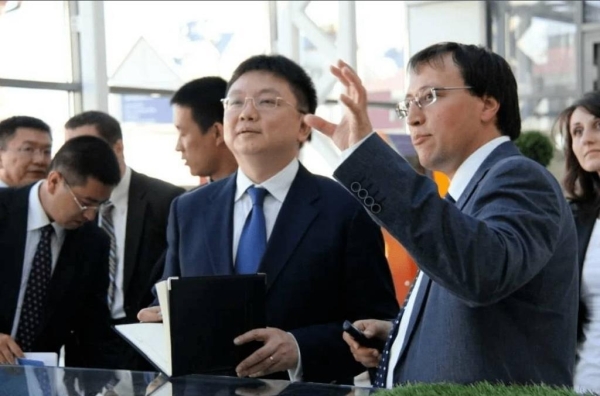Western sanctions drive Russian and Asian businesses towards each other

- The ongoing withdrawal of Western business from Russia has given unique opportunities for Middle Eastern, Asian and Latin American companies
- A National Coordination Centre has been created to help Asian companies strengthen business ties with Moscow

Last year, although Russia found itself in a complicated economic situation due to the acute crisis in relations with the West, its economy managed to get a breathtaking 3,5% growth. How did that become possible when Europe and the U.S. are rapidly reducing their trade and investment relations with Russia?
According to statistics from Eurostat, exports from the EU to Russia fell by about 40% since 2022. Europe is striving to reduce its dependency from Russian hydrocarbons to a minimum, preferably to zero in the next few years.
The volume of mutual trade with the United States has decreased several times. Washington as well is seeking to minimize imports from Russia. In particular, a ban on uranium import has been introduced. Earlier, Washington announced its intention to stop purchasing Russian engines for space rockets.
However, contrary to forecasts, Russia’s economy and exports are growing, primarily due to the rapid turn to Oriental markets.
Asian and Middle Eastern companies do face sanction risks from cooperation with Russian partners. Russia’s Asian counterparts experience issues with currency transfers, air and ground transportation, secondary US sanctions, etc.
Nevertheless, as the Chinese proverb says, “water will always find the way”, and those Chinese, Indian, Arab and Turkish firms who want to enter the 140-million Russian market continue to invest in Russia and develop partnerships benefitting from the flight of Western entities. As it was said in one famous Hollywood movie: money never sleeps.
“We will fill the niches the West is leaving for us in Russia”, a Chinese investor says. His company is now helping a large Chinese car manufacturer to establish production at a Russian plant which once belonged to a European car giant. According to official data, in 2023 trade and business cooperation with Asia accounted for almost 70% of the Russian external trade turnover.
AdvertisementThe need of Russian business in establishing mutually beneficial relations with Asian partners and vice versa, as well as business structures in other parts of the world that keep interest in cooperation with Russia, despite sanctions, contributed to the creation of special business associations in Russia to facilitate this task. As the Russian media “Nezavisimaya” reported, the National Coordination Center (NCC) for International Business Cooperation was launched in Moscow in late 2022.
Founded as a top-level think tank for researching Asian markets and establishing business cooperation, it has an ambition to become the main gateway for Russian businesses going East and Asian trade and investment coming to Russia.
While most Russian entrepreneurs know quite little about doing business in Oriental markets, NCC declares its professionals will help to find reliable partners, analyse industries, regulations and market trends, and contact high government authorities which are crucial for successful businesses in most Asian countries as well as Russia itself.
NCC’s basic mission is said to become a centre of expertise and best service for Russian business entities entering new markets and forming new partnerships in Asia, Middle East, Africa and Latin America.
The co-founders of NCC include the largest business associations such as the Russian Union of Industrialists and Entrepreneurs, Chamber of Commerce and Industry, the Russian Export Center, and the “Business Russia” Union. One of the most prominent academic think tanks, the Institute of China and Contemporary Asia of the Russian Academy of Sciences, has also joined the project. Foreign investment strategies are elaborated in collaboration with A1, the oldest and best-known Russian investment firm.
NCC seems to gain popularity among Russian business groups. State-owned giants such as Russian Railroads and privately owned Renova and AEON are among the members of NCC, and Alfa Bank and Gazpromneft are declared to be joining.
“Russian businesspeople were originally quite reluctant to turn to the East”, Andrey Guryev, an analyst from Moscow says. “They know the West and are well acquainted with the European and American business cultures, while Asia was a terra incognita for most large corporations. Now it’s different: the interest towards Asia is everywhere, and China, Emirates or India are considered as quite perspective directions. Think tanks such as NCC are established in order to guide top managers to doing business in Asia and Middle East, and this is quite a profitable business”.
Different from numerous private consultancies, NCC is acting on behalf of the Russian government and thus is considered a reliable and responsible partner by Asian counterparts who, as in China, are accustomed to coordinate their large projects with the authorities.
At the same time, Asian businesspeople coming to Russia also need such a guide to identify trade and investment opportunities, find and check local partners, comprehend intricate Russian legislation. NCC declares it will help Chinese, Indian, Middle Eastern investors to establish presence on the Russian market and propose projects and assets to invest in. Whatever the sanction risks, hundreds of Asian corporations are coming to enjoy these opportunities.
By now, NCC formed partnerships with Asian business associations working in Russia, including the Union of Chinese Entrepreneurs in Russia, the Moscow office of CCPIT (the main Chinese commerce and industry chamber) and the China Overseas Investment Corp. All the three accumulate Chinese companies wishing to check the Russian market, and NCC is a natural partner for them.
Share this article:



